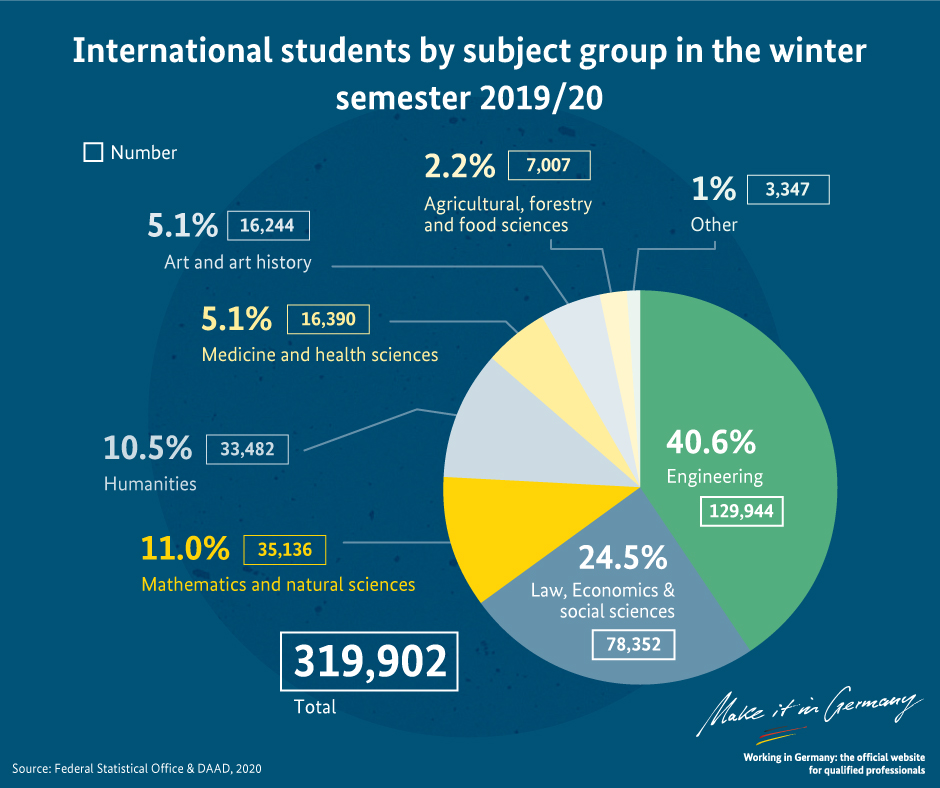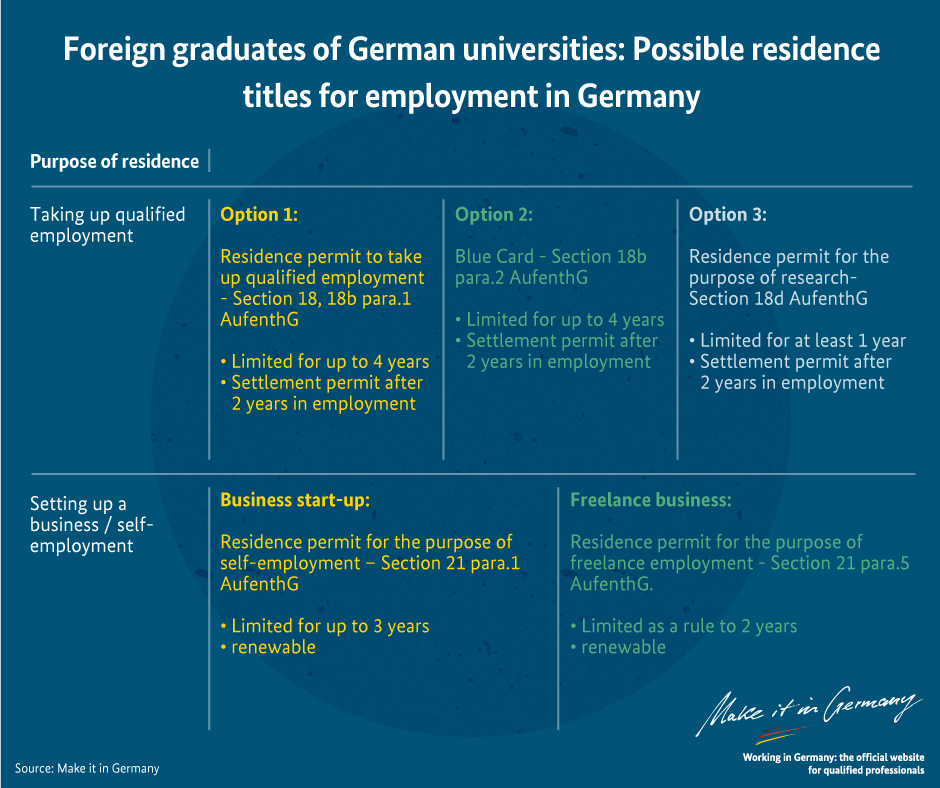
International students in Germany: prospects after graduation
02 July 2021: International students at German universities represent a particularly important potential pool of skilled workers. Their advantage: In addition to their professional qualifications, they are familiar with the cultural facets of Germany and the German language. It is also easy for them to enter working life, as international graduates have good prospects for employment and staying in Germany.
Germany is one of the most popular study destinations for international students worldwide. This is due in particular to the good career opportunities and prospects for staying in the country after graduation. According to official figures, 411,601 students with a foreign passport were enrolled at German universities in the 2019/20 winter semester (Federal Statistical Office, 2020). A large proportion of them (319,902 students) immigrated for their studies. This group currently represents 12.7 percent of students at universities and 8.4 percent of students at universities of applied sciences.
It is particularly striking that many students choose fields of study that are in high demand on the German labour market: A large proportion of international students (40.6 percent) are pursuing degrees in engineering. In second and third place, the subject groups of law, economics and social sciences (24.6 percent) and mathematics and natural sciences (11 percent) dominate.

Work and Study: Clear rules for the employment of international students
Even during their studies, international students can also acquire practical know-how, for example by being employed as a student assistant alongside their studies. There are clear rules for this case: Students from the EU, the European Economic Area (EEA) and Switzerland may, like German students, work up to 20 hours per week during the lecture period. During the semester break, they can work without restrictions. Students from so-called third countries who have a residence permit for the purpose of studying pursuant to §16 AufenthG (German Residence Act) may take up employment for 120 full or 240 half days per year without the approval of the Federal Employment Agency.
Self-employment is also possible for international students during their studies. However, this requires the approval of the relevant Foreigners Authority. The authorities must check, among other things, whether the self-employed activity does not impede or delay the achievement of the study objective and whether it does not result in a change of the purpose of residence because the activity takes up a greater amount of time than the studies.
In addition, international students from third countries have further options pursuant to § 16b (4) AufenthG (German Residence Act) - even if they have not yet completed their studies:
- Instead of studying, international students can switch to qualified vocational training if they wish to discontinue their studies before graduation. Before taking up vocational training, they must apply for the corresponding residence permit pursuant to § 16a AufenthG (German Residence Act) at the relevant Foreigners Authority.
- International students can already take up full-time employment before completing their studies if the knowledge and skills they have acquired so far enable them to do so. This is the case, for example, for students who are about to drop out of their studies and are looking for new perspectives in Germany. In such cases, the purpose of residence can be changed if there is a concrete job offer. Upon application, the skilled worker is granted either a residence permit to perform a qualified profession or a residence permit for other employment purposes under § 19c (2).
The transition to the job market: How it works!
According to a survey by McKinsey and the Stifterverband, more and more companies in Germany are particularly interested in hiring university graduates with international experience[1] At the same time, many foreign students want to stay in Germany after graduation and gain their first work experience here.
Graduates from the EU and EEA are on an equal footing with German job seekers due to the EU freedom of movement. They therefore do not require special permission to gain a foothold in the German labour market.
University graduates from third countries, on the other hand, must observe several things in order to continue their stay in Germany:
- Immediately after successfully completing their studies, they can change their residence status without leaving Germany. If they already have a binding job offer that matches the academic qualification they have acquired, they can obtain the corresponding residence permit directly: These include the residence permit for qualified professionals with academic training under § 18b (1) AufenthG (German Residence Act) the EU Blue Card § 18b (2) AufenthG (German Residence Act). In both cases, a settlement permit can be issued after two years in employment at the latest (see Figure 2) – this means that the specialists can then live permanently in Germany.
- If the aim is to work in science as a researcher, under certain conditions a residence permit for the purpose of research §18d AufenthG (German Residence Act)) can be granted[2]. A settlement permit can be applied for, similar to qualified professionals, after only two years of employment.

If a qualified job is not yet available at the time of graduation, graduates can be granted a residence permit to seek employment §20 (3) no.1 AufenthG (German Residence Act) in Germany. This entitles them to stay in Germany for up to 18 months. Unlike new immigrants, who enter Germany with a visa to look for a job, graduates can be employed without restriction while they are looking for a job, e.g. they can work as temporary employees and as helpers on a temporary basis. This not only enables them to secure their livelihood, but also gives them faster access to the labour market.
Self-employment in Germany
After successfully completing their studies in Germany, international academics can become self-employed in Germany. There are two types of self-employment: Starting up a business as a self-employed entrepreneur or working as a freelancer. Depending on which form of self-employment is sought, a residence permit for self-employment can be issued to tradespersons and freelancers. The respective residence permit is initially issued for up to three years. It is also possible to change from self-employment to a settlement permit.
Further information on Make it in Germany
Notes:
[1] Stifterverband für die deutsche Wissenschaft in cooperation with McKinsey & Company, Higher Education Report 2020, annual report 2015, p.29: : https://www.stifterverband.org/hochschul-bildungs-report-2020-bericht-2015 (External link)
[2] A researcher is any person who holds a doctoral degree or an appropriate university degree with access to doctoral programs (Art. 3 of Directive (EU) 2016/801).
Do you have any questions?
Let us advise you on your opportunities to work and live in Germany. Our experts will support you with questions regarding job search, visa, recognition and learning German.
You can find out more about the various contact options by clicking on one of the icons in the bar below.
